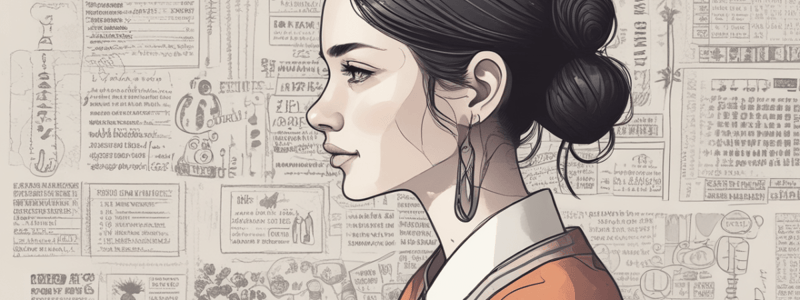Podcast
Questions and Answers
What type of conditional is used to describe universal truths or scientific facts?
What type of conditional is used to describe universal truths or scientific facts?
- Second Conditional
- Zero Conditional (correct)
- Third Conditional
- First Conditional
In the first conditional, what tense is used in the main clause?
In the first conditional, what tense is used in the main clause?
- Present simple
- Past simple
- Past perfect
- Future simple (correct)
What type of conditional is used to talk about unreal or hypothetical situations and their consequences?
What type of conditional is used to talk about unreal or hypothetical situations and their consequences?
- First Conditional
- Third Conditional
- Second Conditional (correct)
- Zero Conditional
In the third conditional, what tense is used in the if-clause?
In the third conditional, what tense is used in the if-clause?
What type of conditional is used to talk about hypothetical past situations and their present consequences?
What type of conditional is used to talk about hypothetical past situations and their present consequences?
What type of conditional is used to express regret or talk about past opportunities that were missed?
What type of conditional is used to express regret or talk about past opportunities that were missed?
The ______ conditional is used to describe universal truths or scientific facts.
The ______ conditional is used to describe universal truths or scientific facts.
If you heat ice, it ______.
If you heat ice, it ______.
If I won the lottery, I ______ buy a house.
If I won the lottery, I ______ buy a house.
The ______ conditional is used to talk about likely or possible future situations and their consequences.
The ______ conditional is used to talk about likely or possible future situations and their consequences.
If I had studied harder, I ______ have passed the exam.
If I had studied harder, I ______ have passed the exam.
The ______ conditional is used to talk about the present consequences of a hypothetical past action.
The ______ conditional is used to talk about the present consequences of a hypothetical past action.
Flashcards are hidden until you start studying
Study Notes
Conditional Structures in English
Zero Conditional
- Used to describe universal truths or scientific facts
- If-clause: present simple
- Main clause: present simple
- Example: If you heat ice, it melts.
First Conditional
- Used to talk about likely or possible future events
- If-clause: present simple
- Main clause: future simple
- Example: If it rains, I will take an umbrella.
- Used to express plans, intentions, or predictions about the future
Second Conditional
- Used to talk about unreal or hypothetical situations and their consequences
- If-clause: past simple
- Main clause: would + base form of the verb
- Example: If I won the lottery, I would buy a house.
- Used to express impossible or unlikely situations and their consequences
Third Conditional
- Used to talk about past hypothetical situations and their consequences
- If-clause: past perfect
- Main clause: would have + past participle
- Example: If I had studied harder, I would have passed the exam.
- Used to express regret or talk about past opportunities that were missed
Mixed Conditionals
- Used to talk about hypothetical past situations and their present consequences
- If-clause: past simple or past perfect
- Main clause: would + base form of the verb or would have + past participle
- Example: If I had studied harder (past), I would be a doctor now (present).
- Used to express regret or talk about past decisions and their present consequences
Studying That Suits You
Use AI to generate personalized quizzes and flashcards to suit your learning preferences.



